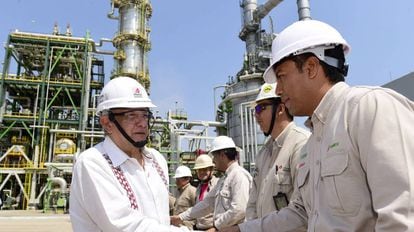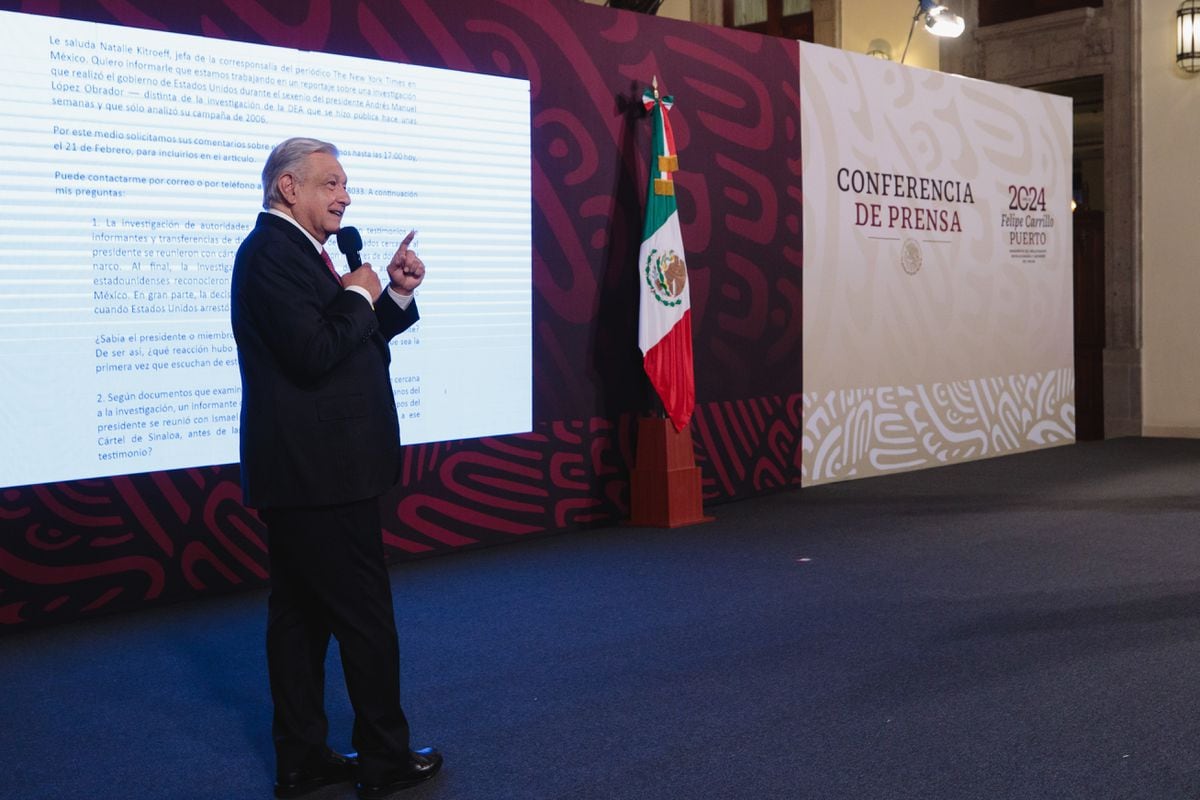López Obrador, during a visit to a Pemex refinery in 2020.
If Andrés Manuel López Obrador were a businessman, he would be in charge of companies with total sales of an exorbitant amount of 83,000 million dollars and would be responsible for the generation of five out of every 100 jobs in Mexico.
As a public entrepreneur, your decisions would directly affect 10% of the total value of the Mexican economy and indirectly the rest.
More information
The Mexican Government will create a company to compete in the gas distribution business
Pemex retains the operation of the important Zama oil field
Through the activities of Petróleos Mexicanos (Pemex), the Federal Electricity Commission (CFE) and the Institute of the National Housing Fund for Workers (Infonavit), the Government of López Obrador would concentrate more sales power than any businessman in Mexico. His strongest rival would be Carlos Slim, owner of América Móvil, Grupo Carso, Condumex, Inmuebles Carso and Sanborns. With these companies, Slim would be responsible for 60,000 million dollars in sales per year. That is, 72% of the total sales of public companies led indirectly by Andrés Manuel.
In this essay I speak of López Obrador, not as president of Mexico, but as responsible for three of the largest companies in Mexico and 15% of the total gross production of the economy of that country.
I describe their business bets and how they have fared in recent years, as well as their upcoming business ventures.
I get into his character and the way he seems to make decisions, sometimes putting his gut before the poor.
And I am talking about the future of the Mexican State.
The most critical issues that López Obrador will be facing in the coming years are related to the fact that the president is not only responsible for three of the largest companies in Mexico, but also for redistributing resources in a country where 48% of the population it is poor.
The bad bets
As CEO of public companies, López Obrador would have, in many respects, bad accounts to deliver.
In 2018 it would have received three companies with total sales of 2.6 billion pesos.
By 2020, sales would already be 36% lower overall.
It is not only that.
In terms of net profit, the precarious situation of 2018 (with losses of 127,000 million pesos) would be even more so in 2020 with losses of 538,000 million pesos between the three companies.
And this would not be exclusively due to the effects of the pandemic.
In fact, since 2019 the total net profit of the three companies was negative, with reported losses of 283,000 million pesos.
In other words, companies were already bad and are even worse, but not all in the same way.
López Obrador's main company, Pemex, is by far the worst undertaking in the Mexican state. It is worse than any other. Since López Obrador took power, the company has accumulated losses of at least 856,000 million pesos, which has meant that by 2021, Pemex has lost its preeminence as the largest company in Mexico for the first time in 45 years. It has yielded its place to América Móvil who, for the first time since 1976, has positioned itself as the company with the highest sales in Mexico, with one billion pesos a year.
The second supposed jewel of the Mexican public economy, the CFE, is not doing well either.
Although in 2019 it managed to increase its net profits to reach 52,000 million pesos, by 2020 the situation was very different.
In 2020, the CFE had losses of 79,000 million pesos reaching red numbers in net terms during the entire López Obrador government.
In two years as CEO, López Obrador could report that Pemex and CFE accumulate losses in net income of 883,000 million pesos, equivalent to 1.3 times the total health budget of the Mexican Government.
The good bets
Not everything is going wrong in the Mexican state economy. Silently, but constantly, Infonavit has been consolidating itself as one of the true jewels in the crown of the Mexican public economy. Only in 2020, for example, Infonavit became one of the 20 companies with the most sales in Mexico, higher than those of giants such as OXXO, Ford and Volkswagen.
Among financial companies, Infonavit is the fourth most important in Mexico, only below BBVA, Banorte and Citibanamex. The company is responsible for placing seven out of every 10 home loans in Mexico, and it does so with far fewer staff than other banks. For example, while BBVA has 37,000 employees and Banorte has 30,000, Infonavit only has 4,500 workers. Its efficiency, based on a relatively brief structure, is due to the fact that the law prohibits it from using more than 0.5% of its resources in administrative tasks. In other words, unlike Pemex or CFE, Infonavit does not have political pressure to create public employment and therefore operates relatively efficiently.
Not only that, but Infonavit flourished during the pandemic. The Fund was declared essential activity from the beginning and after a couple of months its main ally, the construction industry, was declared essential as well. That impulse, as well as important reforms to expand the types of loans it offers, made Infonavit increase its sales in a year in which most companies fell. In fact, of the 20 Mexican companies with the most sales in 2020, only Walmart, Bimbo and Cemex increased their sales in a greater proportion than Infonavit.
Infonavit is a giant, the true most important company of the Mexican State, but that few seem to turn to see.
With a net profit of 22,000 million pesos, Infonavit is the seventh most profitable company in Mexico.
Only surpassed by América Móvil, Walmart, BBVA Bancomer, Grupo México, Banorte and Americas Mining Corporation.
On the contrary, Pemex, the public company that everyone looks at, is the company with the highest total losses in Mexico.
Businessman
An important reason why the Mexican state economy has such mixed results is the inconsistency in the quality of decision-making.
López Obrador has two opposing personalities to direct them.
His irrational side, visible in energy companies, and his social side, observable in his approach to Infonavit.
Its two sides lead to different results. On his irrational side, López Obrador cannot control his desire to monopolize energy production, even if it leads to significant losses in the short term. Bad decisions accumulate losses. On his social side, the president shows the best side of himself: a desire to have a positive impact for the working class.
His irrational side cannot be more evident than with Pemex. The company is obsessed with mining complex fields itself without having the capital or the capacity to do so. This obsession prevents private agents from exploiting certain deposits, generating losses not only for the private ones but also for the State itself. To this must be added the unclean way in which many decisions are made that affect the oil industry, opening up space for countless litigation and underutilization of productive investments.
The lack of good decisions is also evident with CFE. Mexico needs to significantly expand its capacity to meet the energy demand that will be in the coming years. However, the decisions of the CEO, Andrés Manuel, do not go in that direction. Rather than proposing ways to collaborate with the private sector to meet future demand together, the president seems confident that the CFE will be able to meet demand on its own. We don't know how. Or that investors will magically arrive, even if conditions are bad. The change in the electricity dispatch rules promoted by the López Obrador government makes private investment in the sector extremely difficult, and above all makes energy more expensive. Ironically, the worst affected are the poorest.
With Infonavit, however, the situation is different, mainly because the company is sitting on a huge amount of resources. Infonavit receives 5% of the base salary of all formal workers in Mexico. A formidable amount of resources that, even, other governments have proposed to reduce. For example, during the past administration there were discussions about the need to reduce it to 2%, in order to dedicate the rest to unemployment insurance and retirement.
It is with Infonavit, a healthier company, that López Obrador's social character has been able to take shape.
Important reforms have brought credit closer to those who did not have it before.
Now, for example, credit can be used to finance self-production of housing and the purchase of land.
Furthermore, now workers will be able to access credit with less contribution time, they will be able to do so at an older age and they will have an easier time restructuring their debts, something that undoubtedly helps those who have less.
The big problem with López Obrador is that he is very good at managing the bonanza, but very irrational accepting the lack.
The future
In the future López Obrado sees two new public companies.
The first, Gas Bienestar, with the aim of distributing gas at low prices.
The second, less known outside of close technical circles, is the possibility of converting the Mexico City International Airport (AICM) into a productive state company.
The AICM is a profitable company and therefore, there are those who observe the possibility of increasing them if it is given the character of a productive company.
With Gas Bienestar the gains seem unlikely.
The price of gas in Mexico depends to a great extent on international markets and not only on local production.
This means that keeping prices low would be impossible without heavy subsidies.
Furthermore, it seems that López Obrador is not clear about what is the problem to be solved in the LP gas industry. As Cofece has mentioned, reducing gas prices requires measures that go beyond creating a single new company. For example, it would be necessary to improve efficiency in the use of storage spaces and in the use of transport by pipelines. Furthermore, prices could fall if the points of sale were increased through actions such as selling LP Gas in Diconsa stores. That is, not to create a company but rather to create spaces for collaboration between public infrastructure and private goods.
Of course, the work of public companies should not be to obtain high profits, but it should be to keep alive.
The resounding losses at Pemex and those accumulated by CFE should be a red light, especially because they seem to show that the viability of maintaining them as public monopolies is low.
In general, as a businessman, López Obrador must invest in the long term, but with clarity about how to solve short-term problems.
Be a visionary, but with a good diagnosis.
And above all, to be able to find mechanisms to collaborate with the private initiative in order to improve the access of all Mexicans to the services offered by State companies.
The time for a strict division between the private and the public is over.
At the forefront of any left there must be mixed models that take the best of the market and the government at the same time.
Subscribe here
to the
newsletter
of EL PAÍS México and receive all the informative keys of the current situation of this country


/cloudfront-eu-central-1.images.arcpublishing.com/prisa/SUXSGP2YZBHQLNK4QN5DDKB32U.jpg)
/cloudfront-eu-central-1.images.arcpublishing.com/prisa/5DVWGWV2YVBJXKT7LKXMVHXHTE.jpg)
/cloudfront-eu-central-1.images.arcpublishing.com/prisa/GJFCNCM6TNAC5PJK5YHBZ3DI7A.jpg)










